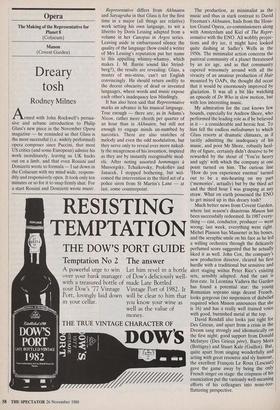Opera
The Making of the Representative for Planet 8 (Coliseum) Manon (Covent Garden)
Dreary tosh
Rodney Milnes
Armed with John Rockwell's persua- sive and urbane introduction to Philip Glass's new piece in the November Opera magazine — he reminded us that Glass is the most successful (i.e. widely performed) opera composer since Puccini, that most US critics (and some European) admire his work inordinately, leaving us UK hacks out on a limb, and that even Rossini and Donizetti wrote to formula — I sat down in the Coliseum with my mind wide, respons- ibly and responsively open. It took only ten minutes or so for it to snap firmly shut. For a start Rossini and Donizetti wrote music. Representative differs from Akhnaten and Satyagraha in that Glass is for the first time in a major (all things are relative) work setting his own language, to wit a libretto by Doris Lessing adapted from a volume in her Canopus in Argos series. Leaving aside in embarrassed silence the quality of the language (how could a writer of Mrs Lessing's reputation put her name to this appalling whimsy-whamsy, which makes J. M. Barrie sound like Strind- berg?), the results are revealing: Glass, a master of mis-stress, can't set English convincingly. He should return swiftly to the decent obscurity of dead or invented languages, where words and music expose each other's inadequacy less blindingly.
It has also been said that Representative marks an advance in his musical language. True enough — there are, as in Adams's Nixon, rather more chords per quarter of an hour than in Akhnaten, but still not enough to engage minds un-numbed by narcotics. There are also snatches of melody and even the odd modulation, but they serve only to reveal ever more naked- ly the meagreness of his invention, inspired as they are by instantly recognisable mod- els. After noting assorted hommages Mussorgsky, Tchaikovsky, Prokofiev and Janacek, I stopped bothering, but wel- comed the intervention in the third act of a police siren from St Martin's Lane — at last, some counterpoint. The production, as minimalist as the music and thus in stark contrast to David Freeman's Akhnaten, hails from the Hous- ton Grand Opera, co-commissioners along with Amsterdam and Kiel of The Repre- sentative with the ENO. All wobbly projec- tions and dry ice, it might have looked quite dashing at Sadler's Wells in the 1950s. The minimalist action concerns the pastoral community of a planet threatened by an ice age, and as that community capered winsomely around with all the vivacity of an amateur production of Hair mounted by OAPs, the thought did occur that it would be enormously improved by glaciation. It was all a bit like watching an episode of Dr Who in slow motion, but with less interesting music.
My admiration for the cast knows few bounds, especially for Andrew Shore, who performed the leading role as if he believed in it — a considerable and heroic feat. To him fell the endless melodrames to which Glass resorts at dramatic climaxes, as if tacitly admitting the inadequacy of his music, and poor Mr Shore, robustly heal- thy of figure, certainly didn't deserve to be rewarded by the shout of 'You're heavy and ugly' with which the company at one point turned on him. The curious line `How do you experience enemas' turned out to be a mis-hearing on my part (`memories', actually) but by the third act and the third hour I was grasping at any straw. What on earth possessed the ENO to get mixed up in this dreary tosh?
Much better news from Covent Garden, where last season's disastrous Manon has been successfully redeemed. In 1987 every- thing — cast, conductor, producer — went wrong; last week, everything went right. Michel Plasson has Massenet in his bones, and the seraphic smile on his face as he led a willing orchestra through the delicately perfumed score suggested that he actually liked it as well. John Cox, the company's new production director, cleared his first hurdle with a traditional but sensitive and alert staging within Peter Rice's existing sets, sensibly adapted. And the cast is first-rate. In Leontina Vaduva the Garden has found a potential star: the young Romanian soprano sings decent French, looks gorgeous (no suspension of disbelief required when Manon announces that she is 16) and has a really well trained voice with good, burnished metal at the top.
David Rendall also looks just right for Des Grieux, and apart from a crisis in the Dream sang strongly and idiomatically on the first night; good support from Donald McIntyre (Des Grieux pere), Barry Mora (Bretigny) and Stuart Kale (Guillot). But, quite apart from singing wonderfully and acting with great resource and sly humour, the excellent Francois Le Roux (Lescaut) gave the game away by being the only French singer on stage: the crispness of his enunciation put the variously well-meaning efforts of his colleagues into none-too- flattering perspective.










































































 Previous page
Previous page